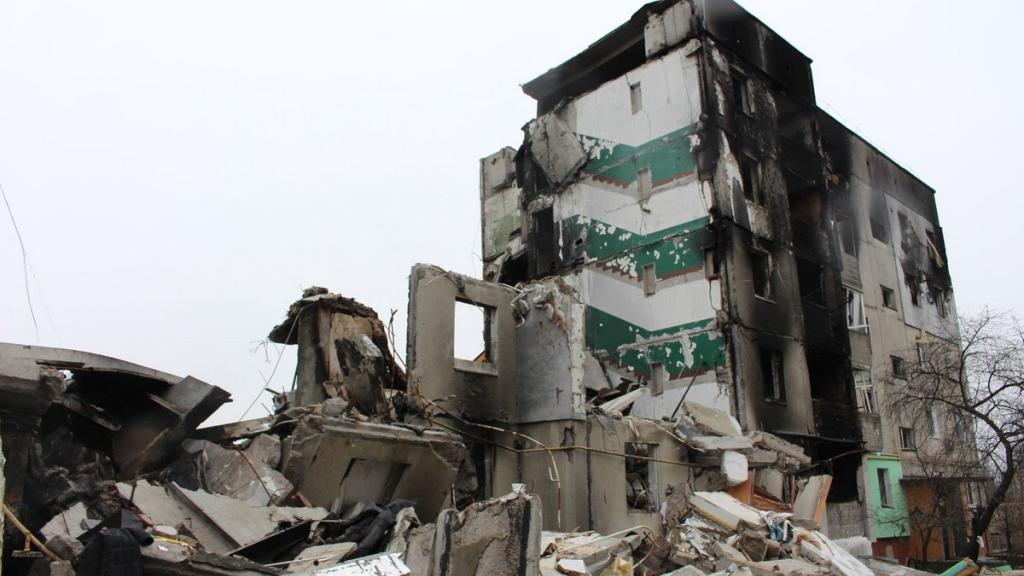Ukraine: Russian troops out — stop the genocide

First published at Anti*Capitalist Resistance.
There is no ceasefire in Ukraine, just like there is no ceasefire in Palestine. On 24 February, it will be two years since the brutal invasion of Ukraine. The situation is grim, with little gain in pushing back the Russian occupation. Despite the massive destruction and the huge number of casualties and refugees, Ukrainians are still “rallying around the flag” and overwhelmingly continue to trust Zelensky. Ukrainians have no choice but to continue fighting for the liberation of their country because Putin’s objectives remain the same as they were two years ago, namely to “de-nazify and demilitarise the country.” Russia’s Foreign Minister Sergei Lavrov confirmed this when, just after Christmas, he said that Israel’s goals in its war against Hamas in Gaza are “nearly identical to Moscow’s in its campaign against the Ukrainian government.”
Like Israel in Gaza, Russia is systematically destroying the basic infrastructure of the country, killing civilians, and abducting children. The difference is that Ukraine is able to defend itself because it has an army with tanks, artillery, and air defence systems, so the scale of the genocide is not as great as it is in Gaza. That’s why Ukraine is not calling for a ceasefire, unlike the Palestinians, who are crying out for one. Zelensky, however, has backed Israel in its war on Gaza in order to demonstrate his allegiance to Western interests—a move that Ukraine’s left has condemned and for which it has expressed its solidarity with Palestinians.
Ukraine could make much greater gains against the Russian army if it were supplied with the weapons it needs. The war is lasting too long and has had an impact on economies. The far-right in the US and Europe are blocking aid packages to Ukraine as they push their nationalist and isolationist agenda. If it is right for Ukraine to defend itself against imperialist intervention, then it should have the means to do so. But the West and NATO, who cynically saw this as an opportunity to rebrand themselves as guarantors of democracy, are now starting to get cold feet. Western imperialism and NATO have always preferred to back brutal regimes like Israel or Saudi Arabia that are loyal to their interests rather than the people fighting against oppression and for democracy and independence. In Britain, Starmer has made it clear that if Labour is elected, he will continue down that road, declaring that “Labour’s commitment to NATO is unshakeable.” Zelenskyy understood the cynical role of Western imperialism when he told the Economist a month into the war: “There are those in the West who don’t mind a long war because it would mean exhausting Russia, even if this means the demise of Ukraine and comes at the cost of Ukrainian lives. This is definitely in the interests of some countries. For other countries, it would be better if the war ended quickly, because Russia’s market is a big one and their economies are suffering as a result of the war.”
Ukraine could do much better in the war if it adopted a “war economy” like the US and Britain did in World War Two, which put private companies under state control to produce tanks and planes rather than cars. Instead, Zelensky has adopted a neo-liberal approach, encouraging “start-ups” to produce drones in small workshops and preparing the country for integration into the EU. Ukraine has been parading itself at reconstruction conferences where it offers to open up the country to transnational capitalist corporations rather than demanding the abolition of its debt and a plan for a socially just reconstruction. Inside the country, the government has been trying to “reform” labour laws and marginalise existing unions. Nevertheless, there have been successful struggles by trade unions and social movements, in particular nurses, who have been fighting for the payment of wage arrears.
A brutal, imperialist, and expansionist regime is destroying Ukraine. Putin can continue to produce weapons at a greater rate than Ukraine is using and to throw soldiers into the meat grinder. It is estimated that 315,000 Russians have been killed or injured, which is close to the 350,000 Russian troops that invaded Ukraine on 24 February 2022. These are dangerous times for the people of Ukraine, with whom we should be in solidarity and support their struggle for liberation, in spite of the Zelensky government. There are simple and practical solidarity measures that show that the people of Ukraine have not been forgotten, such as making direct links with trade unions and the left in Ukraine, raising money for medical aid, and campaigning to cancel the debt. As the second year of the war approaches on the 24 February, we still call for Russian Troops Out Now.